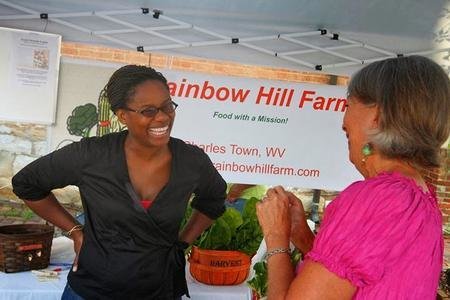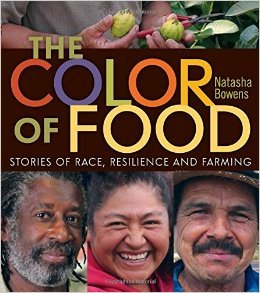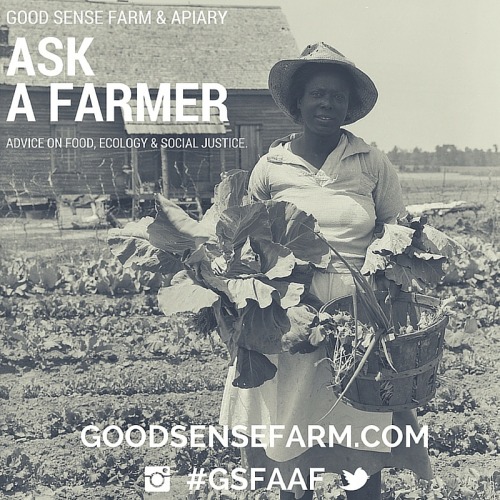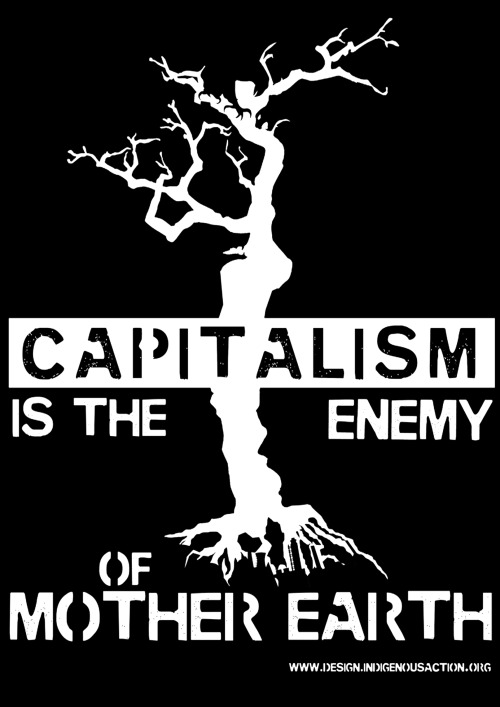#end capitalism
Are Plants Intelligent? | Psychology Today
Animal-centric" views about “minds” need to be broadened to include all living beings on our planet. Science has already shown that merely visiting plants can alter herbivory, including seed production and competition—the Herbivory Uncertainty Principle—so it’s important to keep the door open about the inner lives and intelligence of the diverse florae that bless Earth. Bonding with trees can also foster optimism and hope.
The inaugural edition of Good Sense Farm’s “Ask a Farmer” column begins with a familiar question and ends with a twist. First the question, sent by someone who found out about us on the internets :
Good morning,
I…am on the quest to find black owned business to support for my life needs and wants. I have been very successful as now I have several DMV black farmers to support; however, I am having a hard time finding animal farmers for chicken/eggs, pork, etc. Can you direct me to local farmers or a black owned butcher shop that sources from Black Owned farms?
Thank you for any guidance you can provide. I look forward to supporting you and the rest of the agricultural farmers in the area.
J
I read this question through once and thought to myself, “how do I break it to them?” Here’s myfirst answer, unedited, untouched by the gift of hindsight.
Hey J,
Thanks for your inquiry. This is a great question.
While I truly wish it was a matter of just pointing you in the direction of a directory or list of black farmers to meet your needs, unfortunately it’s not that easy anywhere in the country. Access to the type of land that it takes to run an animal operation is a major obstacle on the farming front and urban development which supports small businesses like that black butcher that we both so earnestly want, just aren’t there and require real work to bring those resources back to our community. DC, like the rest of the country, has a really rich history of innovative black food producers but also a really deep legacy of structural inequity and intentional discrimination that make maintaining a business very difficult for black farmers and food producers.
As a result, producers are largely small and unconnected to larger markets. When they do reach larger markets you can’t distinguish their products from white producers. There has only recently been a resurgence in interest in the distinction in a way that might make it profitable for the producer. That’s why I am so happy that you asked this question! It’s proof that people want to know their black farmer a little better and are perhaps willing to invest directly in the growth of black farms to turn the current trends around.
Though I’m not sure how you came upon my information, I hope that in your search you heard about our work building a network of supportive infrastructure for farmers of color and connecting them to markets. Good Sense Farm cofounded Community Farming Alliance for DMV farmers of color in 2013 which is steadily building a network of farmers of color and resources to help them thrive.
Currently, we run a Community Supported Agriculture Program which offers, veggies, mushrooms, honey, medicinal herbs and, yes, eggs to our members.
We are always looking for more farmers to add to the network, particularly those with products that we know our customers want. We are also actively trying to mentor young farmers of color to get into the business and provide them with the resources to be successful. My hope is that folks like you will consider joining us and will spread the word that supporting cooperatives like ours is the best way to support the return of black artisinal producers outside of pushing for radical structural changes toward justice and equity in the food system.
I hope this information is helpful to you in your search and that, perhaps, we will meet soon. Your enthusiasm and earnest investment in our growth as food producers is appreciated and needed.
Best,
Zachari J. Curtis
I hit send, and didn’t think much more of it. J responded unsurprised. We shared hopes for a someday fix. We made pledges to meet real soon and that was that, or so I thought.
Nothing in my response was untrue but something kept bothering me about it. No, it wasn’t the self-promotional tone, though, you know.
In a recent email, my comrade in farming Gail Taylor, cofounder with me of Community Farming Alliance, lifted up an experience that made me reflect again on my response and the side of the story that doesn’t get told. Gail’s reflection on meeting Jahi Ellis, at a meeting of SAAFON: the Southeastern African American Farmer’s Organic Network.:
Like many of you, I had read the article about Ellis in [Civil Eats] that talks about how he’s in survival mode and struggling to make ends meet. What I think the article missed, which was clear when I met him last week, is how inspiring, capable, and determined Ellis is.
And there it is folks. Before you call it over for black farmers, we must all consider a few things. We have survived and come to thrive under tremendous pressures. We honor those who have not survived by keeping their names and their lessons in our minds and mouths. Our networks of resilience are not readily searchable and were not meant to be. We, like other folks, have resisted surveillance and traceability to create safe havens for our art, industry and livelihoods.
The world hasn’t changed that much since there was a need for mutual aid organizations and financial and business institutions that appeared on the outside like social clubs. Jessica Gordon Nembhard, community organizer and researcher, catalogs the atmosphere in which black communities fomented some of the most progressive economic institutions known in our history and our legacy of strategic collective resource sharing. Her book Collective Courage: A History of African American Cooperative Economic Thought and Practice, remembers the practices and institutions which black communities cultivated for their collective welfare.
From collective manumission to black labor unions, these institutions and practices promoted economic solidarity and provided the financial resources for radical social change movements of the time. Black coops were not just doing business, they were bailing people out, raising money for land and creating jobs for disposed members of the struggle. Talk about #FUNDBLACKFUTURES. Hear Jessica talk about the dangers, toils and snares.
Get Collective Courage and Join the Collective Courage Wisdom Circle.
Nembhard also dedicates a significant portion of the book and her work to talking about current emergent strategies that are a part of that legacy of resilience. Translation: we’re still in the game today and visibility isn’t the only measure of value. These systems of protection are not unique to black communities but they are purposeful and driven by data. I thought about this, reflected on everything I knew and kicked myself for telling the old story–the one about complete eradication, forced subversion and invisibility the end.
So what does that mean for me, someone fielding a question about the existence of black farmers/butchers/artisans? It means that I was offered the rare opportunity to tell the whole story and so I must. Hence my revision of my answer to the “Where are all the black farmers/butchers?” question.
I honestly know quite a few folks who are leading the way and who have taught me a lot about the business. They have their own ways of engaging communities around their work. I will try to share what I know Here’s what I know about where to get some meat raised, slaughtered and sold by black sustainable farmers and leave space for what I don’t know.
Black Meat Farmers near DC…an addendum
Market Poultry - Eastern Market, SE, DC

Longtime vendors at the reknown year-round artisinal market, Market Poultry specializes in fancy poultry and game birds. When I called (because I had to) a lovely sweet sounding voice is what you hear on the voicemail line. Most likely, it’s someone’s favorite aunt who can probably give you a recipe for roasted pheasant that will make you cry. Just saying. More information about Market Poultry here.
Thorne Farm - Westminster, MD

Greg Thorne is a native of Howard County, Maryland. His family has lived there since at least the mid 1800’s. His great grandparents and other family members owned several small farms in the West Friendship area, so farming is in his blood. His grandfather was an avid gardener while Greg was growing up, and taught him well. After being born in Boston and spending my early childhood in Michigan, I grew up in the Maryland suburbs, but always wanted to live on a farm.
Thorne and his wife, Kris, raise sheep for wool and meat in addition to growing veggies. Greg’s specialty is “wool with character” which means it doesn’t look like the stuff you get at the big box craft outlet. They sell at farmers markets in their area so if you don’t live nearby consider taking a roadtrip and pick me up a side of mutton and some sweetbreads (kidneys - yeah that’s how I get down. #teamorganmeats). I met Greg at a farmer of color gathering last year and was so struck by his positivity and the legacy of his farm.
Rainbow Hill Farm- Charles Town, WV

Farmer Gale Livingstone (different Gale than mentioned above) was born in Georgetown, Guyana and moved to Brooklyn, New York in 1981 as a child to live with her family. In 1991, Gale moved to the DC Metro area where she lived until 2010. Prior to owning Rainbow Hill Farm, Gale grew vegetables in containers on her deck and rented space with a community gardening program in Maryland to feed her love of farming. Gale’s passion for food motivates her to grow the freshest vegetables possible and stay committed to being self-sustaining and environmentally responsible.
Gale’s farm is certified organic and produces some of the best eggs on the east coast (yeah, I said it). We carried Gail’s eggs in our 2015 Cooperative CSA box and look forward to a long happy relationship with this super dedicated farmer.
Vanguard Ranch- Luisa, VA

Renard and Chinette Turner run Vanguard Ranch, as a family owned and operated farm committed to sustainable and organic agricultural practices. At the core of their operation is our commercial meat goat herd. The goats produce a great natural fertilizer as they browse and assist us in keeping the land open. The Turners have developed a line of natural gourmet goat meat products and sell their goat as prepared foods, capturing the value that is lost when farmers sell wholesale and preserving it to invest in their operation. Both Renard and Chinette are a fascinatingly brilliant people. Renard’s passion will get anyone believing they, too, should be a goat farmer (don’t get sucked in…or do, you’ve been warned). Chinette is the picture of quiet power. You’d be well served to listen closely when she speaks. It will be important.
You can learn more about black farmers who operate in your area from a lot of sources. You can read their stories in books like The Color of Food, written by my friend and comrade Natasha Bowens. See Renard on the front cover?

[We hold this space]
for the farmers, ranchers and butchers who’s presence we’re not aware of but who aren’t “gone” or “disappeared” or “eradicated.” We lift up the ones who don’t have websites, the ones who don’t do social media, the ones who don’t have volunteer days and the ones who don’t deal with the USDA. We wish them prosperity beyond measure and encourage you, the eater determined to support black farmers, to hold them in your hearts, reach out respectfully and thank them for holding it down.
We also hold this space for imagination. Imagine what it would be like to live in the world where black farmers, butchers, ranchers and artisans are well supported and connected to the people who love them and want to see them thrive. Imagine what their food tastes like and what it would mean for the pedigree of your food to extend to the farmer. Imagine if “Cage Free” meant “grown by workers making a fair wage” and “Organic” meant “supporting environmental and economic justice in communities of color.” Imagine the taste and smell of that world? What is it seasoned with? What tools and resources do we have to create to support that vision? What of those things do we have already? Who among our kindred do we know that can help us put the pieces together to make it happen?
I hope I gave you a bunch to chew on.
Sincerely,
Ask A Farmer
Like what you’re reading? Want answers from Good Sense Farm? Email thoughts and questions to [email protected].
Post link
A man named Wynn Alan Bruce used self immolation (settings oneself on fire) in front of the Supreme Court to protest government inaction on fighting climate change. This method of protest was made famous by Buddhists monks protesting the atrocities of the Vietnam War. Our Earth will be destroyed because saving it is not profitable. The government will not make the news of this man’s sacrifice and its reason well known, they don’t want it to be known. Destroy capitalism, save the earth. Rest in power Wynn.
Elon Musk just bought Twitter for $43B
His net worth is $264.6B
Musk’s true tax rate between 2014-2018 was 3.27%
Tuition free college would cost ~$28B annually


